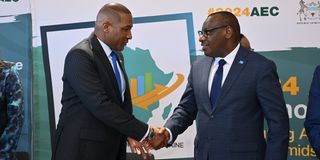Duma Boko: African leaders should call each other out on bad governance

Botswana President Duma Boko (left) with Dr Claver Gatete, the Executive Secretary of the UN Economic Commission for Africa at the start of the African Economic Conference in Gaborone on Saturday.
Botswana's new President Duma Boko wants other African leaders to call each other out when they deviate from their pledge to serve the people or break the law.
Speaking on Saturday at the Africa Economic Conference in Gaborone, Mr Boko urged other African leaders to stop dwelling on misdeeds such as coups, corruption and bad governance that have all combined to keep the continent mired in poverty.
The 54-year-old lawyer was elected president in early November after his Umbrella for Democratic Change coalition defeated then-president Mokgweetsi Masisi's Botswana Democratic Party in a landslide for the first time in 58 years. Botswana has been praised for its smooth transition, with the former president conceding defeat and then attending Boko's inauguration.
He said that African leaders have maintained a habit of not criticising each other when they fail to deliver on promises or refuse to follow the continent's established policies on governance. Although he did not name any specific country, he was critical of what he termed unnecessary wars on the continent, fuelled by greed.
"The importance of ending armed conflicts that hinder development by silencing the guns in Africa cannot be overemphasised. This will create a stronger and more integrated Africa, a continent better equipped to navigate the dynamics and challenges of global trade," he told the Africa Economic Conference in Gaborone, which was also streamed online.
Painful realities
"When we are supposed to be addressing issues, we are often fighting with figures and statistics that flatter only to deceive. So we need to rise above self-adulation to deal with the painful realities of some of our actions," he argued.
The conference, a hybrid event organised by the United Nations Economic Commission for Africa, the African Development Bank and the United Nations Development Programme, was designed to allow leaders to discuss Africa's economic future at a time of global uncertainty.
But Boko said Africans don't like honesty and what he called "an open acknowledgement of our weaknesses and failures that have left us stuck as a continent".
Botswana has often resisted the trend of political upheaval in many African countries.
According to Transparency International's 2023 Corruption Perceptions Index, Botswana scored 59 on a scale of 0 ("highly corrupt") to 100 ("very clean"). It ranks behind only the Seychelles and Cape Verde on the transparency index.
Its leaders have invested much of the revenue from diamonds, its main export, in health, education and social welfare, making the country's GDP per capita of $7,250 in 2023 one of the highest on the continent. The average in sub-Saharan Africa is $4,800.
He argued that Africa's problems could be overcome with 'deepened democracy' and said lifting people out of poverty should be everyone's ambition.
The forum was held as Africa fights for a fair share of compensation from richer countries for climate change damage. Dr Claver Gatete, the Executive Secretary of the UN Economic Commission for Africa, said annual losses from climate disasters in Africa range from $290 billion to $440 billion, in a continent that also needs about $1.3 trillion a year to meet the Sustainable Development Goals due by 2030.
"To move beyond aid dependency, Africa needs to become a magnet for private investment.
This requires the de-risking of our investment environment," said Dr Gatete.
"Through strengthened governance, transparent systems and innovative insurance mechanisms, we can mitigate investor risks," he added.




